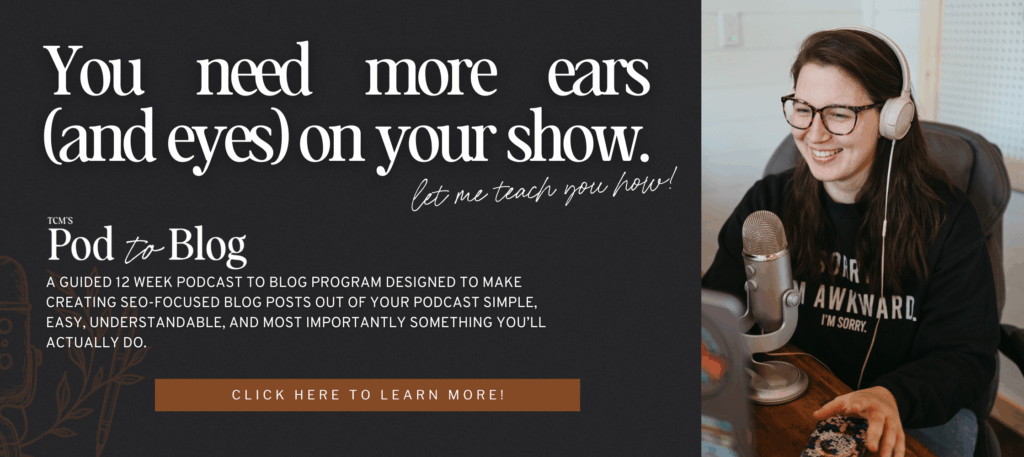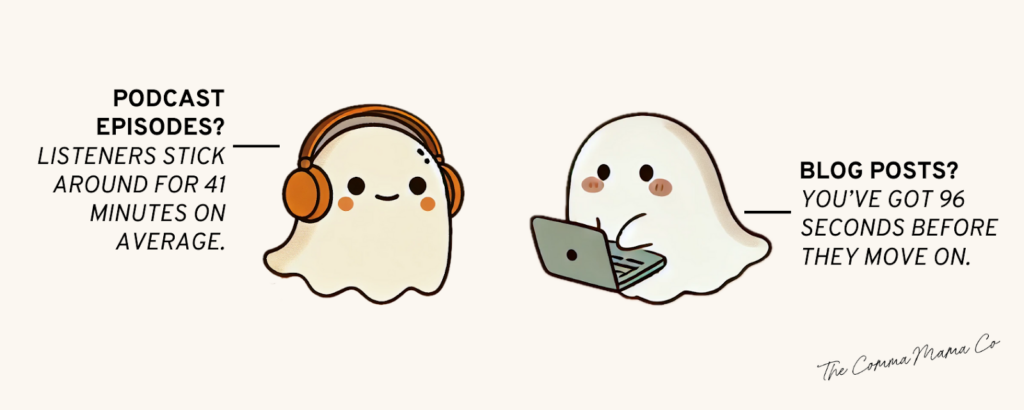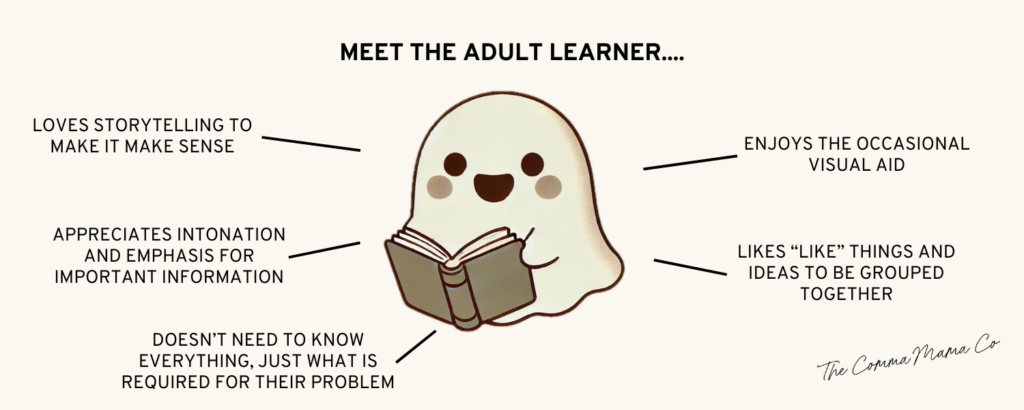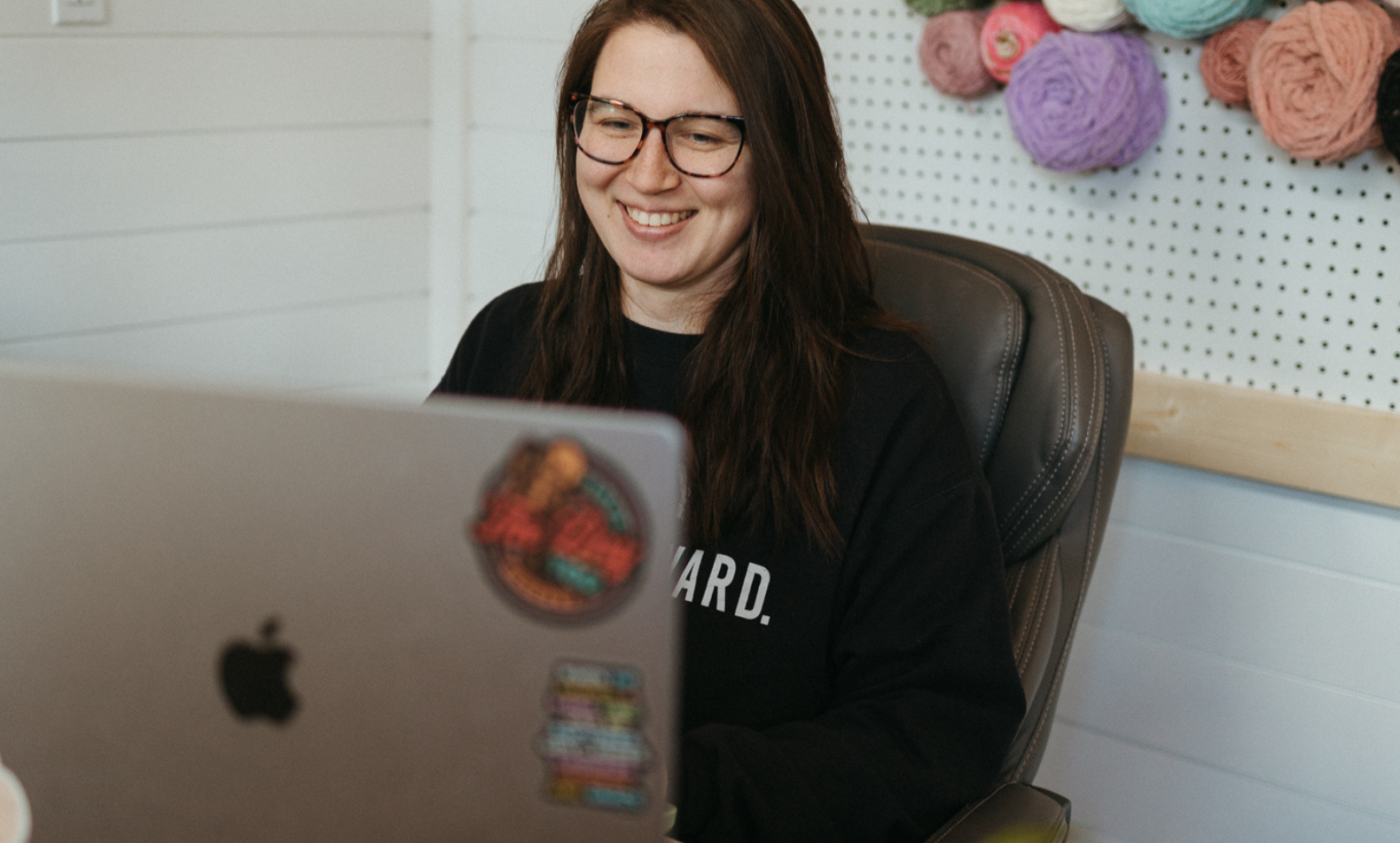I have a love for words and a knack for SEO – and as a mama, I know just how challenging it can be to run a business while raising a family. This blog is just one of the many resources you’ll find here that’ll help you boost your online visibility without sacrificing your sanity.
Thanks for being here (and I hope you’ll stick around).
Mckayla
categories
blogging
seo
Business
Six simple steps to better seo
download now
explore
case studies
to the shop
work with us
follow us on instagram
share
There’s a pretty big trend happening right now—or more specifically, two trends. You have the business owner’s leaning back into blogs (you’ve probably seen the “blogs aren’t dead” posts floating around), and then you have almost the opposite: podcasts.
Two long-form pieces of content that are convenient and easy to access when someone has a question or problem to solve that grow your business in similar ways. One isn’t necessarily better than the other (although die-hard fans may argue with me there), but statistically, they’re both doing the most for your business.
They’re essentially two roads leading to the same destination — and the route is determined by your audience (your listener and/or reader). Knowing which road your audience will take and when makes it so much easier to meet them where they’re at, showing up when they need you most.

The Difference Between Podcast Listeners and Blog Readers
There’s nothing inherently different about all podcast listeners and blog readers, they’re not two totally different people. If there is a difference between the two, it’s more likely that your readers aren’t interested in listening to your podcast—even if the content of your episode is exactly what they’re looking for.
While podcasting is consistently growing (almost an 80% increase in listeners in the US between 2022 and 2023), the first blog was created in 1994 and 83% of internet users still consistently read blog posts in 2025—a 6% increase compared to 2024. To sum it up: blogs have the home court advantage.
Even though they’ve been around for awhile, there are still people who are unaware of podcasts—and because Google doesn’t index and rank Podcast episodes using SEO like it does blog posts and YouTube videos, it’s rare for an episode to be spontaneously introduced to non-podcast listeners.
But, ultimately, the difference between podcast listeners vs. blog readers is their intent. It’s the reason WHY they’re consuming your content and WHEN they want to consume it.
When (and Why) People Listen to Podcasts vs. Read a Blog Post

The main reason why someone might choose over the other is due to the time they have available, and what that time looks like. The average podcast episode is 41 minutes long, while readers only expect to spend 77 to 96 seconds reading a blog post.
That’s not to say that podcast listeners have 41 minutes of freetime to sit still and listen to your latest episode, rather, 94% of podcast listeners multitask while listening. They’re doing household chores, commuting to/and from work, working out, walking, baking, and even working.
Listeners are also more likely to plan time in their day (or, at least, during these multitasking times) to listen to a podcast. Blog readers are rarely like that.
Sure, there are readers that check on a website regularly, but this, more often than not, is related to news and entertainment. For other businesses and brands with a blog, their readers are more sporadic. People find their blogs when they have a need, interest, or problem to solve.
It could be while they’re prepping dinner and needing a substitute for sour cream because there was less in the fridge than they thought, while they’re in their website backend and need help setting up their Google Analytics, or, if you’re my husband, at 11pm determining which breed of chicken is best to introduce to our coop.
How People Read vs. Listen (And Why That Even Matters

Let’s scroll past the time needed (or expected) to consume your content when listening vs. reading, because technically you could listen to a 3 minute reel and learn something (which is barely a difference in time when compared to time on blogs)—there are other differences to focus on.
Listeners (your podcast audience) benefit from audio cues like tone of voice, inflection, and emphasis—all of which allow your message to stick in your listener’s brain.
Podcasters also tend to share personal or client stories and anecdotes which, as adults, help us engage with content as were connecting to both the rational and emotional parts of the brain.
Blog readers stay engaged with a little bit of storytelling (not too much though, or you’ll lose their attention), chunking (grouping like things and ideas together), and the occasional visual aide. You’re writing for adult learners (because that’s what your audience is doing, learning)—even if it is “just” a blog post.
It’s important because you can’t record a podcast episode like you would write a blog post—and you definitely can’t write a blog post like you would record a podcast (sorry, no copy-pasting transcripts and calling it a “blog post” recommended here). If you do, your audience won’t be able to consume it the way you’d hope, leading to a lack of conversions.
What About Conversions? How Well Do Listeners & Readers Convert?
This might surprise you, but listeners and readers convert at the same average rate—around 5%, despite the difference in time spent on your content.
If you want to get specific—which I’m always willing to be—B2B podcasts have an average conversion rate of 2% to 5% while consumer-focused podcasts have an average rate of 5% to 10%. A blog CTA on the other hand, has an average conversion rate of 4% to 5%, whether you’re B2B or consumer-focused.
Of course, the exact rate depends on you and your audience and the content you’re creating—and how well they meet the needs and expectations of your audience.
If You’re Stuck Between Blogging and Podcasting…
Do both! If you love your podcast, but feel like it’s not expanding your reach the way you need it to, start a blog! You can easily repurpose your podcast episode into an SEO blog post and make the most out of the content you already have.
In fact, I have an entire program kicking off Sept 3rd, 2025 teaching you how to turn your podcast episodes into SEO blog posts if you’d like to join in 😉 just click here!
But, if you’re not feeling a podcast, you can stick with blogging. Podcasts help build connections with your audience, but if you’re not “in it,” they’ll know and notice ASAP—and it won’t convert (which was likely the whole reason you pushed through and created it anyways).
Reader Etiquette
© - Content and images in this blog are copyright this blog unless stated otherwise. Feel free to repost or share images for non-commercial purpose, but please make sure to link back to this website and its original post.
℗ - We do not store any information about your visit to our website other than for analytics and optimization for content and reading experience through the use of cookies.
c/o - Our site does at times contain paid advertisements, sponsored content, and/or affiliate links.
You might want to check these out too while you're at it
FREE Guide:
6 Simple Steps For Better SEO
INSTANTLY IMPROVE YOUR GOOGLE RANKING
Want to improve your website SEO in one afternoon? This free resource offers 6 actionable steps you can take in 15 minutes or less to instantly improve your SEO.
download now
categories
blogging
SEO
business
It's me, hi! Your SEO bestie.
get to know me
work with us
//
services
//
case studies
//
Mom of three, lover of all things blogging, and borderline obsessive coffee drinker — I also just happen to love making complicated things simple and accessible, especially when it comes to SEO. The blog is a collection of what I've learned from years of testing, trial and error, and working with amazing clients with impactful businesses (just like yours). Blogging and SEO doesn't have to be boring — and it definitely doesn't need to be difficult.



